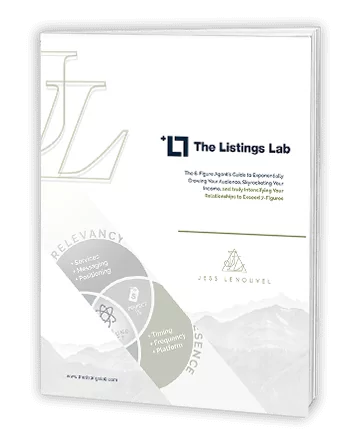Here’s a business task you MAY have been procrastinating. I’m talking about creating your real estate budget.
Look, I get it…
Budgeting definitely isn’t the sexiest part of running a real estate business.
But just because talking about finances isn’t as exciting as sales and marketing doesn’t mean it’s any less important.
Because at the end of the day, if you can MAKE money, but you don’t know how to KEEP it…
You’re going to struggle.
You need to understand how to budget for your business if you want to make your biggest money goals a reality.
Part of shifting your identity from a real estate agent to a real estate CEO means knowing your numbers.
Understanding where you’re at financially is the key to making sound business decisions – about investments, team members, operation expenses and so much more.
So if you’ve been burying your head in the sand – that ends now.
It’s time to face the music and create your real estate budget.
These five essential real estate budgeting tips will help you go from unsure to uber-confident about your business’s numbers!
Separation Is Key
Here is the number one most important tip when it comes to budgeting for your real estate business.
You MUST keep your business budget and your personal budget separate.
Your commissions are not your personal income. Your business pays you your personal money. Your business doesn’t provide all of your personal money.
You don’t want to mix and match between your accounts either.
Every business expense MUST come from your business account, and personal expenses need to be paid out of your personal account. It doesn’t matter if you’re a corporation, sole proprietor, LLC, or whatever else – treat your business like a real business and get it a dedicated account!
By keeping your personal and business finances separate, you’ll be able to more easily track your expenses and income, and you’ll be able to avoid confusion (and potential legal issues!) down the line.
Pro tip: I find the best way to create that separation between the accounts is to have them at two separate branches/banks. This prevents you from being tempted to dip into them or mix accounts!
Real Estate Budgeting ≠ Restriction
If you’re neglecting your budget or have resistance to the task, it might be helpful to rethink your mindset.
Some people think of budgeting as being restrictive and limiting, but that doesn’t have to be the case.
In reality, budgeting is about being more intentional with the money you have – and making sure you’re putting your money towards the things that are most important to you.
I am by no means suggesting that you purge your life of all of the things that bring you joy! Quite the opposite.
If getting a latte at Starbucks makes you a happier human – then go for it.
Similarly, when it comes to the business side, budgeting doesn’t imply being stingy with investments. If a $25/month software is going to make your life easier, then in my opinion, that’s a heck-yes.
But on the other hand, if you have subscriptions you purchased years ago that you’ve barely been using…it’s time to audit your real estate budget and cut some things out.
By creating and maintaining a budget, you’ll be able to make smarter financial decisions and be far more confident in your spending.
Beware of Lifestyle Creep
If your business revenue has been growing, it’s important to be aware of “lifestyle creep.”
This is when your spending gradually increases over time as your income increases.
You get a bigger mortgage.
A nicer car.
You start taking more expensive vacations.
There’s nothing wrong with enjoying the finer things in life.
The problem is when your lifestyle requirements start growing at a faster rate than your business.
Now, rather than using your profits to reinvest back into your business and grow it even more, you’re draining your business bank account to keep up with your personal expenses.
This will seriously deteriorate your business’s health.
When you experience lifestyle creep, you also tend to start making business decisions from the lens of personal ones.
The biggest indicator that someone is viewing their commissions as money to fuel their lifestyle is when someone says “I need to check with my husband/wife first”, before making an investment decision.
This shows that you view investing money that your business generated as taking away from your personal income, or income for the family.
This couldn’t be further from the truth.
Remember, your personal savings goals and spending habits should all be derived from the salary you pay yourself from your business.
Your salary should be another line item on your real estate budget.
So when that $40k commission check comes through, don’t start dreaming up a 2-month vacation to the Maldives.
Remember – you’ve got a team to pay, marketing expenses, taxes, software and so much more.
By keeping your spending in check and being intentional with your money, you’ll be able to avoid lifestyle creep and stay on track with your financial plan.
Be Patient With Yourself
When it comes to budgeting, it’s important to be patient with yourself.
Think about developing financial knowledge the same way you learn a new language.
When you’re first learning a new language, you feel totally in over your head. You try to watch shows and listen to music and you feel like you’re barely understanding anything.
Then slowly, over time, you might pick up on 20% of what they’re saying.
Then 40%.
And then, before you know it, you can watch an entire episode and understand almost everything.
The same goes for your finances.
It’s okay to feel overwhelmed or like you don’t know what you’re doing when you first start out.
Learning to manage your finances effectively can take time, and it’s okay to make mistakes along the way.
With patience and practice, you’ll be able to master the art of budgeting and make it a natural part of your financial routine.
Revisit Your Budget Regularly
Creating a real estate budget isn’t a set-and-forget solution.
You need to regularly revisit your budget and make adjustments as needed.
Once you get in the habit of doing this, you’ll often find that you have items on your budget that you no longer need or use.
Monthly subscriptions you’re no longer using can easily go undetected for months, eating into your precious cash reserves.
Contractors and team members who aren’t pulling their weight will stay on payroll because you haven’t had time to look at the ROI they’re producing.
The solution?
Do a quarterly audit of your budget and assess what things you should continue to pay for – and what things you should cancel.
When you get to know your numbers intimately, you’ll be much more intentional with the financial decisions you’re making.
Your income and expenses will likely change over time, and it’s important to make sure your budget reflects those changes. By revisiting your budget on a regular basis, you’ll be able to stay on top of your finances and make sure you’re always working towards your financial goals.
Open A Business Savings Account
You should be saving 25% of your business’s income. Period.
Because again, it’s not just about making money. It’s about keeping money.
Think about this…
How much more secure would you feel day-to-day if you had 3 months, 6 months, or even 12 months’ worth of savings to keep your business afloat?
Your savings should be an automated expense in your business’ budget.
Think of it like a tax you need to pay, something that’s non-negotiable.
And if 25% still feels way too far away for you, start with 10%. Then, bump it up to 20%. And slowly, you’ll get to where you need to be.
This money should not be withdrawn unless it’s a business emergency or you need to make a really big, strategic decision that will propel your business forward.
This is the oxygen supply for keeping you afloat when the unexpected happens.
Look at Budgeting as a Way to Hit Investment Goals
If you’re struggling to motivate yourself to stick to a budget for your real estate business, it might be helpful to change your perspective.
Learning how to manage your budget isn’t just about trimming expenses in your day-to-day life.
It’s about making those big, lofty money goals a REALITY.
With budgeting, you’re able to set up a system to build up your investments. And I don’t just mean investing in your business.
I mean more passive investments.
Whether that’s real estate, the stock market, or even a different venture – budgeting gives you options.
This can be incredibly motivating!
Real estate is a very active business. But when you funnel your hard work into more passive investments, you’re setting yourself up for financial success in the future.
In 10 years, with the right strategy, you could be making 6 figures passively.
Being strategic with your real estate budget gives you that opportunity.
Want to learn more about what it takes to build a 7-figure real estate business?
Join us in The Listings Lab Facebook Group For Real Estate Agents for more high-value trainings and advice to build a profitable, scalable business.








